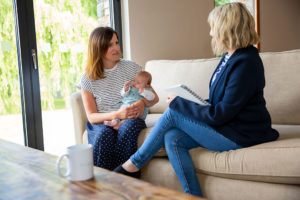Top 5 Tips for Better Sleep
 Sleep! It’s so important and it becomes a big topic when you have a little one! Are you getting enough? Is your little one going to settle tonight? Have they started doing something different and you’re not quite sure how to handle it. Rest assured, Little Dreams Consulting are here to explain what’s going on and how to help!
Sleep! It’s so important and it becomes a big topic when you have a little one! Are you getting enough? Is your little one going to settle tonight? Have they started doing something different and you’re not quite sure how to handle it. Rest assured, Little Dreams Consulting are here to explain what’s going on and how to help!
While the four-month sleep regression is the only true sleep regression, there are lots of reasons that sleep can go off track for your little one. They might be ill or teething or maybe you’ve been on holiday and so the routine you had, no longer seems to be working. If any of these sound like a reason sleep feels like it’s gone backwards, it’s time to check out our top five tips for better sleep:
Sleep tip #1: Sleeping environment
Make it really dark. The best thing to simulate our ‘awake hormones’ is sunlight so, in order to help the production of melatonin (the ‘sleepy hormone’), your child’s bedroom should be 10/10 for darkness. You could install some blackout blinds or a travel blind or even foil or cardboard. If your little one is old enough o be scared of the dark a small night light should do the trick.
Also try to ensure that there’s not too much distraction in the bedroom, it should be a calm and relaxing place for your child to be during the night.
Finally, be mindful of the temperature, as being too hot/cold can impact the quality of sleep, try to keep it between 16-20 degrees.
Sleep tip #2: Bedtime routine
When your child’s body and brain start to associate things like baths, stories, brushing teeth, putting on pyjamas, all done in the same order at the same time every night, it makes it a lot easier for them to fall asleep (not to mention the scientific benefits of body temperatures and baths for a start)! A good bedtime routine could include a bath, putting pyjamas on and one or two stories. The important thing is to put your little one into bed awake. With toddlers and older children, a visual guide of what is coming next can be really helpful.
Before you start the ‘upstairs’ part of the bedtime routine, you could introduce a ‘sleepy snack’, something low in sugar and easy to digest – such as banana, yogurt, wholemeal toast or a sugar free cereal like porridge – and some quiet playtime too.
Sleep tip #3: Consistency
All children thrive on boundaries, but toddlers even more so! And if those boundaries move, they will be pushed again and again. It is vital to be consistent with children, so they know what is, and is not, going to happen. Consistency must be there 100% of the time, otherwise you are creating a confusing message for your little one, which is unfair.
Sleep tip #4: Awake times and naps!
The recommended amount of sleep your toddler needs over one 24-hour period is 11 to 14 hours. Pre-schoolers need 10 to 13 hours. So, pay attention to awake times in the day – don’t forget those naps! The average age to drop naps all together is 2 ½ -3 years old. Until this point, toddlers can generally only manage 5-6 hours of awake time. Without naps, little ones can get cranky and difficult to settle if overtired and it may well increase the frequency of those early morning wakes too!
Sleep tip #5: Independent sleep
A crucial element for teaching children to go to sleep, and stay asleep, is independent sleep, where a child gets themselves to sleep by themselves. We all have ways that we sooth ourselves into sleep. If your child depends on a “prop” to fall asleep – such as rocking, a dummy or a parent, then they will find it difficult to get back to sleep without their “prop.” It is important that we teach our children these skills so they can settle themselves to sleep and begin to sleep more peacefully. If they rely on something external to fall asleep, something beyond their control (such as relying on somebody to rock them, feed them etc.) this will increase their anxiety and stress levels (increasing the amount of cortisol their bodies produce) and make it even harder for them to fall asleep by themselves. They will need to be guided to learn how to fall asleep independently, at this age, without their prop. If you think you need some help with this, do get in touch as we’d love to help your whole family get more and better sleep.
We hope our top five tips help you and your little ones get better sleep – if you do need more help, or you have any questions, book a free, 15 minute, no obligation phone call here: https://bristol.littledreamsconsulting.com/booking/
 About Jenna and Little Dreams Consulting
About Jenna and Little Dreams Consulting
Jenna Wilson set up the multi award winning Little Dreams Consulting 8 years ago, following ten years working as a solicitor in Childcare Law. She has trained with Sleep Sense™ and The Sleep Charity (UK) and has attended a multitude of courses with the NSPCC and The Lullaby Trust. They offer an antenatal package to educate parents about newborn sleep early, so that they don’t need us to solve developed sleep issues later. Please do get in touch to find out more!
The little Dreams Consulting family is growing and is looking for franchisees across the UK to join their successful team of sleep experts. To find out more, pop them an email at franchising@littledreamsconsulting.com for a (no obligation) chat.

